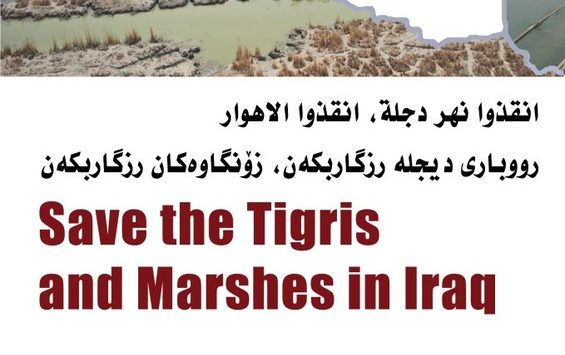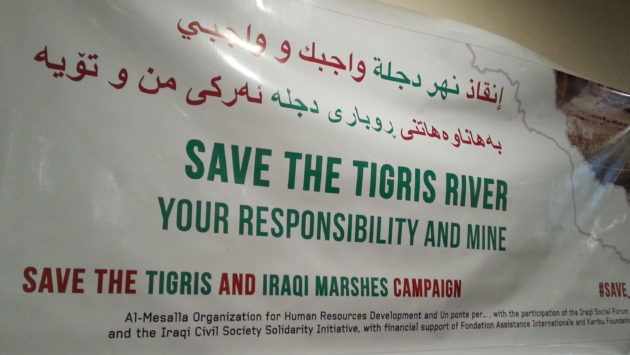Iraqi reading of the Convention on the Law of the Non-navigational Uses of International Watercourses

Iraqi reading of the Convention on the Law of the Non-navigational Uses of International Watercourses [1]
The 1997 Convention on the Law of the Non-navigational Uses of International Watercourses consists of three main sections: the preamble, the articles of the Convention and an annex to the arbitration clause.
The preamble
The preamble paragraphs provide an important background on the problems addressed by this Convention, in particular the escalation of disputes over shared watercourses with the increase of consumption and pollution. It also deals with the foundations upon which this Convention is based, including international cooperation and good-neighborliness. Moreover, It stresses that the adoption of this Convention is of such importance that it can help to promote and implement the purposes of the United Nations in the maintenance of international peace and security, as well as achieving the principle of sovereign equality of all member states (Article 1 and Article 2 of the Charter of the United Nations) [2]. The importance of this reference is to recognize that disputes over shared watercourses are uneasy thing and may even threaten international peace and security, making the United Nations and all its institutions, including the United Nations General Assembly and the Security Council for example, concerned with the respect of the international standards, including this Convention.
The preamble makes it very important that the adoption of this Convention contributes mainly to the protection of watercourses and the achievement of optimal and sustainable utilization not only for present generations, but also for our partners in these rivers of future generations.
The preamble also gives an expression of thanks to the International Law Commission, which has contributed substantively to the drafting of this Convention, and concludes by inviting all States, as well as regional organizations, to join this important Convention.
Articles of the Convention
The articles of the Convention are divided into seven sections. The Convention itself stated this division and gave each section its own title. Below is a review of these sections and the most important articles, as well as their links to Iraq and the Tigris and Euphrates rivers.
Section One: Introduction
The first section is the introduction to the following texts. It includes four articles specifying: the scope of the validity of this agreement, the use of terms, determining the relationship of the Convention to the specialized watercourse agreements and the parties to the watercourse agreements.
In my view, the most important things to stop in this section, for those interested in Iraqi affairs, are two things: the first is that the Tigris and Euphrates rivers apply to the definition of an “international watercourse” and that Iraq and Syria are “watercourse states” under international law [3].
This would resolve the dispute from the viewpoint of international law on Turkey’s claim that the Tigris and Euphrates rivers are “Transboundary Turkish Rivers”. The definition adopted by the Convention applies to rivers and lakes and extends to the groundwater. Article (2) paragraph (a and b) provides the following:
a) “Watercourse” means a system of surface waters and groundwaters constituting by virtue of their physical relationship a unitary whole and normally flowing into a common terminus;
b) “International watercourse” means a watercourse, parts of which are situated in different States;
Iraq should adopt the terms of this Convention in all its relevant official communications at all levels, and alert its diplomats, negotiators and representatives and train them on the use of those terms in Arabic and English. The use of the term “International Watercourse” or “Watercourse State” [4] is not merely a detail but a very important one. The international law has settled these terms around the question, which makes no doubt, let alone those who neglect their use, or diminish its importance, although it preserves the right of Iraq as well as Syria and other countries, which are “States of the international watercourse”.
The second issue concerns the validity of the agreement and its relationship with other international agreements between watercourse states. It is important to note that Iraq does not have a specialized agreement with Turkey on the Euphrates and Tigris rivers. It is something that has its disadvantages, as it can have advantages. The disadvantage is that it is usually brought up to the Iraqi negotiator, that it is difficult to make Turkey commit to a specific agreement or commitment because Turkey protests that there is no specialized agreement signed by it to respect (of course this neglects important general agreements, but has obligations on the issue of water)[5].
What can be considered positive in this case is that the absence of a specialized agreement between Turkey and Iraq makes the provision of the 1997 Convention, specifically the general principles it contains, which an international custom is binding on all countries, whether or not they signed the 1997 Convention [6]. As an example of the applicability of the general principles of the Convention to non-signatory States, an example is provided by the International Court of Justice.
In September 1997, the International Court of Justice, in its consideration of the famous case of Danube River between Hungary and Slovakia, invoked the Convention and referred to the principles of “equitable and reasonable utilization” in Article 5 [7].
There are two things to be aware of in this regard. First, the adoption by the Court of this Convention came despite neither Hungary nor Slovakia being members of the Convention at the time. As for the second, the court actually used the agreement only four months after the adoption of the UN in 1997, even though the agreement did not enter into force as a legal agreement, which happened only in 2014!
What we understand from this important judgment of the International Court of Justice (which is competent in international law) is to affirm the transformation of the principle of “equitable and reasonable utilization” – the cornerstone of the Convention under discussion – into an international norm binding on all States without exception. Today, Turkey or other countries cannot shirk this general principle of international law.
Not only that, but other principles, especially 6 and 7 of this agreement are binding on Turkey, these principles are either binding international custom or on its way to becoming a binding international norm. With reference to the interdependence of these general principles with each other.
While Iraq has specialized agreements with Syria on shared water, the two countries should review their obligations and agreements in the light of the international convention in question, which is encouraged by this agreement is the surest of their rights today, and more importantly, this agreement is the guarantee of the rights of future generations.
It is important to Iraq to be keen in referring to this agreement and commit to the integration of its items in all bilateral agreements and the upcoming negotiations and discussions, which concerns the Tigris and Euphrates rivers and their joint tributaries with Turkey, Syria and Iran [8]. Iraq can also refer to this agreement in its local laws and its supreme constitution, if it wants the next generations to get what the first received from the waters of the Tigris and Euphrates.
To be continued…
[1] This article comes after a preface on the importance of this Convention published under the title “Iraq and the Convention on the Law of the Non-navigational Uses of International Watercourses of 1997”. You can review though the link: http://www.iraqicivilsociety.org/archives/6895
[2] http://www.icj-cij.org/documents/index.php?p1=4&p2=1&p3=0
[3] See Article 2, paragraphs a, b and c of the Convention
[4] In Arabic”مجرى مائي دولي”، “دولة مجرى مائي :
[5] You can find the study of “Ilisu Dam and legal considerations in Iraq”, and download it from here: http://www.iraqicivilsociety.org/archives/2902
[6] See: Everything you need to know about the UN Watercourses Convention, Flavia Loures, Dr. Alistair Rieu-Clarke Marie-Laure Vercambre, WWF
[7] See “Arab Countries and the United Nations Convention on International Watercourses”, Salman Mohammed Ahmed Salman
[8] See Article 3 of the Convention




